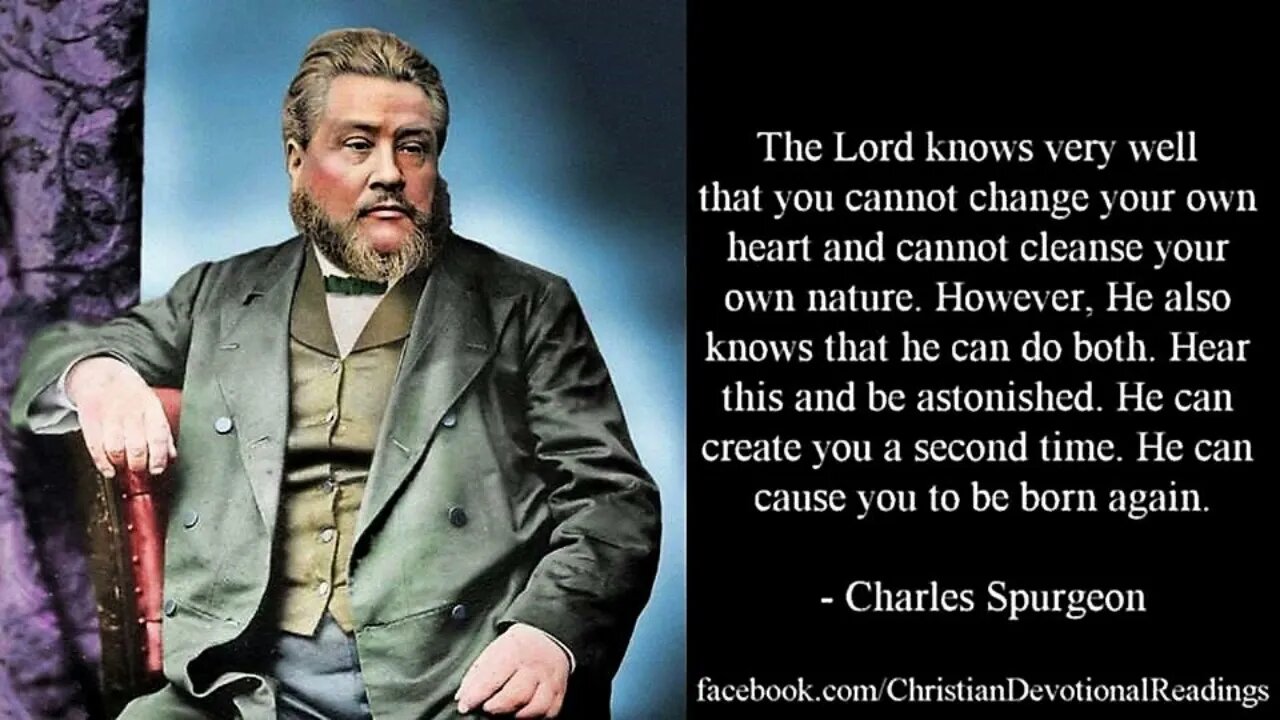Premium Only Content

December 19th PM; Spurgeon's Morning and Evening; Revelation 21:1
December 19th PM; Spurgeon's Morning and Evening; Revelation 21:1
Source:
Prince of Preachers
Phone: (864) 404-1542
Koelsch Broadcasting Productions
5 Scottswood Rd.
Greenville, SC 29615
https://www.sermonaudio.com/solo/pop/sermons/popme1219E/
********************************************************
If You Feel Led, Please Help Support "Clark Clips the Truth" Ministry:
Like. Share. Comment. Subscribe
Patreon: https://www.patreon.com/clarkclips
Thank you so much and may God Bless You Abundantly!
********************************************************
CONTACT: https://www.sermonaudio.com/solo/pop/contact/
ABOUT:
We are a radio broadcast located in Koelsch Broadcasting Productions.
Charles Haddon Spurgeon (1834-92) was England's best-known preacher for most of the second half of the nineteenth century. In 1854, just four years after his conversion, Spurgeon, then only 20, became pastor of London's famed New Park Street Church (formerly pastored by the famous Baptist theologian John Gill). The congregation quickly outgrew their building, moved to Exeter Hall, then to Surrey Music Hall. In these venues Spurgeon frequently preached to audiences numbering more than 10,000—all in the days before electronic amplification. In 1861 the congregation moved permanently to the new Metropolitan Tabernacle.
'And there was no more sea.'
Revelation 21:1
Scarcely could we rejoice at the thought of losing the glorious old ocean: the new heavens and the new earth are none the fairer to our imagination, if, indeed, literally there is to be no great and wide sea, with its gleaming waves and shelly shores. Is not the text to be read as a metaphor, tinged with the prejudice with which the Oriental mind universally regarded the sea in the olden times? A real physical world without a sea it is mournful to imagine, it would be an iron ring without the sapphire which made it precious. There must be a spiritual meaning here. In the new dispensation there will be no division--the sea separates nations and sunders peoples from each other. To John in Patmos the deep waters were like prison walls, shutting him out from his brethren and his work: there shall be no such barriers in the world to come. Leagues of rolling billows lie between us and many a kinsman whom to-night we prayerfully remember, but in the bright world to which we go there shall be unbroken fellowship for all the redeemed family. In this sense there shall be no more sea. The sea is the emblem of change; with its ebbs and flows, its glassy smoothness and its mountainous billows, its gentle murmurs and its tumultuous roarings, it is never long the same. Slave of the fickle winds and the changeful moon, its instability is proverbial. In this mortal state we have too much of this; earth is constant only in her inconstancy, but in the heavenly state all mournful change shall be unknown, and with it all fear of storm to wreck our hopes and drown our joys. The sea of glass glows with a glory unbroken by a wave. No tempest howls along the peaceful shores of paradise. Soon shall we reach that happy land where partings, and changes, and storms shall be ended! Jesus will waft us there. Are we in Him or not? This is the grand question.
-
 10:42
10:42
Russell Brand
4 hours agoJOE ROGAN IS SPEECHLESS
69K62 -
 1:36:20
1:36:20
The Quartering
6 hours agoCybertruck Psyop? Fishy New Orleans Video & FBI BUSTED In Major Coverup!
62.7K39 -
 2:08:45
2:08:45
Tucker Carlson
5 hours agoBernard Hudson: New Orleans Attack, Cybertruck Explosion, CIA Corruption, & Tusli Gabbard
167K188 -
 8:33
8:33
Chef Donny
4 hours agoWarm Up With Some Delicious Wild Rice Soup| Tasty Tailgating Ep. 16 Presented By Pepsi
15.5K5 -
 9:35
9:35
SLS - Street League Skateboarding
10 days agoHow Sora Shirai Won SLS Tokyo 2024 | Best Tricks
21.2K2 -
 4:32:03
4:32:03
GingerDonkey
5 hours agoThe DONKEY Barn is open for business
46K4 -
 40:12
40:12
jessedalba
19 hours ago $0.99 earnedRumble Movie:“Riding an Electric Harley 2,500 Miles to Sturgis… What Could Go Wrong?!”
29.6K10 -
 10:22
10:22
Dr Disrespect
3 days agoDR DISRESPECT - 2024 RECAP
69.7K78 -
 18:03
18:03
Neil McCoy-Ward
8 hours agoThe US 'INCIDENTS' Are just The Tip Of The Iceberg...
26.4K9 -
 1:33:19
1:33:19
Tactical Advisor
8 hours agoThe Vault Room Podcast 007 | Terrorist Attacks Update
56.6K3